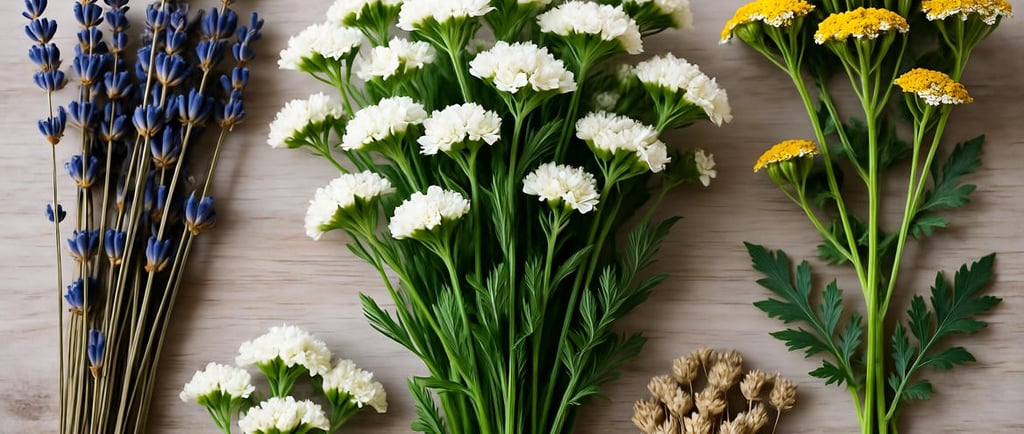Herbal Backer News & Updates: FLASH SALE!!! LIMITED TIME ONLY
Discover the Natures Goodness' of Ayurveda: Top 10 Herbs to Transform Your Respiratory Wellness
Embark on a journey through ancient Ayurvedic wisdom to unlock vibrant lung health for you and your family with these time-honored herbs!
RESPIRATORY SYSTEMRECIPES
11/1/20256 min read


Welcome, dear reader, to a world where the gentle power of Ayurveda breathes life into your wellness routine. Imagine the soothing aroma of sacred herbs filling your home, easing coughs, clearing airways, and uplifting spirits. If you're new to this ancient healing tradition, prepare to be enchanted by 10 remarkable herbs that have supported respiratory health for centuries. Perfect for adults and children alike, this guide will inspire you to embrace nature’s remedies for stronger, happier lungs. Let’s dive into the heart of Ayurveda and discover how to breathe freely with ease!
Top 10 Ayurvedic Herbs for Respiratory Health: Benefits for Adults and Children
Rooted in Ayurveda’s holistic approach, these herbs balance the body’s energies (doshas), particularly Kapha (mucus-related) and Vata (airway-related), to support the respiratory system. Each herb is chosen for its ability to soothe, strengthen, and protect lungs. Always consult an Ayurvedic practitioner or healthcare provider before use, especially for children or those with medical conditions.
Turmeric (Curcuma longa): Known as Haridra, this anti-inflammatory powerhouse reduces lung inflammation, clears mucus, and fights infections with its curcumin content. Adults benefit from its asthma relief; children find it gentle for cold-related coughs.
Vasaka (Adhatoda vasica): Called Vasa, it’s a bronchodilator that relaxes airways, thins mucus, and combats respiratory infections. Adults use it for bronchitis; children over 6 benefit from its cough-relieving properties.
Holy Basil (Ocimum sanctum): Revered as Tulsi, this expectorant expels mucus, fights viruses, and calms Kapha-related congestion. Adults rely on it for allergies; kids enjoy its immune-boosting, soothing effects for mild asthma.
Licorice Root (Glycyrrhiza glabra): Known as Yashtimadhu, it soothes mucous membranes, reduces throat irritation, and thins mucus. Adults find it effective for chronic coughs; children use it short-term for sore throats.
Pippali (Piper longum): This warming herb enhances lung circulation, clears mucus, and strengthens respiratory immunity. Adults use it for COPD; children over 6 benefit from its gentle warming action for colds.
Trikatu (Blend of Ginger, Black Pepper, Pippali): A fiery blend that clears Kapha, opens airways, and boosts digestion to support lung health. Adults use it for congestion; children over 8 tolerate small doses for sniffles.
Sitopaladi Churna: A classic Ayurvedic powder blend (bamboo manna, cardamom, cinnamon, pippali, sugar) that soothes coughs and supports lung vitality. Safe for adults and children over 2 for dry or productive coughs.
Guduchi (Tinospora cordifolia): Known as Giloy, it detoxifies lungs, reduces inflammation, and boosts immunity. Adults use it for chronic respiratory issues; children benefit from its gentle antiviral action.
Pushkarmool (Inula racemosa): A potent herb for asthma and bronchitis, it opens airways and reduces wheezing. Adults find it effective for severe congestion; children over 8 use it sparingly for cough relief.
Talispatra (Abies webbiana): This pine-like herb clears mucus, soothes bronchial irritation, and supports deep breathing. Adults use it for sinus issues; children over 6 find it helpful for upper respiratory congestion.
Why These Ayurvedic Herbs Are Essential for Your Home Remedy Arsenal
Incorporating these herbs into your home is like inviting an ancient healer to guide your family’s wellness. Ayurveda emphasizes balance, and these herbs work holistically to address root causes like excess Kapha or weak immunity, not just symptoms. They’re vital because they’re gentle yet powerful, cost-effective, and adaptable for all ages, making them perfect for families seeking natural alternatives. From soothing a child’s cough to fortifying an adult’s lungs against pollutants, these herbs empower you to nurture health sustainably. Plus, they connect you to a 5,000-year-old tradition, fostering harmony between body, mind, and nature. Start small, and watch your home transform into a sanctuary of vitality!
How to Take Each Herb: Forms and Dosing for Adults and Children
Use high-quality, organic herbs from reputable sources. Doses follow Ayurvedic principles and Young’s Rule for children (Child dose = Adult dose × (Child’s age / (Child’s age + 12)), e.g., for a 6-year-old, ~1/3 adult dose. Always consult an Ayurvedic practitioner for personalized guidance, especially for kids under 2 or those with health conditions. Avoid long-term use of licorice or pippali without supervision.
Turmeric: Tea (1 tsp powder in hot water, 1-3 cups/day adult; 1/3-1 cup child). Capsule (500 mg 1-2x/day adult; adjusted). Mix with honey for kids.
Vasaka: Tea (1 tsp leaves, 1-2 cups/day adult; 1/3-2/3 cup child over 6). Syrup (1 tsp 2x/day adult; adjusted). Short-term use.
Holy Basil: Tea (1 tsp leaves, 2-3 cups/day adult; 1/2-1 cup child over 4). Tincture (1 ml 3x/day adult; adjusted).
Licorice Root: Tea (1 tsp root, 1-2 cups/day adult; 1/3 cup child over 4, 3-5 days max). Powder (1/4 tsp with honey adult; adjusted). Avoid in hypertension.
Pippali: Powder (100-200 mg with honey 1-2x/day adult; pinch for child over 6). Tea (1/4 tsp, 1 cup/day adult; adjusted). Short-term.
Trikatu: Powder (1/4 tsp with honey 1-2x/day adult; pinch for child over 8). Capsule (250 mg 2x/day adult; adjusted). Avoid in high Pitta.
Sitopaladi Churna: Powder (1/2 tsp with honey 2-3x/day adult; 1/8-1/4 tsp child over 2). Tea (1/2 tsp in warm water, 1-2x/day).
Guduchi: Tea (1 tsp stem powder, 1-2 cups/day adult; 1/3 cup child over 6). Capsule (300 mg 2x/day adult; adjusted).
Pushkarmool: Tea (1/2 tsp root powder, 1 cup/day adult; 1/4 tsp child over 8). Tincture (0.5 ml 2x/day adult; adjusted). Short-term.
Talispatra: Tea (1/2 tsp leaves, 1-2 cups/day adult; 1/3 cup child over 6). Powder (100 mg with honey adult; adjusted). Use sparingly.
5 Step-by-Step Ayurvedic Recipes for Respiratory Remedies
These recipes blend Ayurvedic herbs into family-friendly remedies, balancing taste and efficacy. They target common respiratory issues while aligning with dosha-balancing principles.
Kapha-Clearing Tulsi Tea (Holy Basil and Pippali):
Step 1: Boil 2 cups water.
Step 2: Add 1 tsp holy basil leaves and 1/8 tsp pippali powder.
Step 3: Steep covered for 10 minutes.
Step 4: Strain, add 1 tsp honey (optional).
Step 5: Sip warm, 1-2 cups/day for adults, 1/3-1/2 cup for kids over 4—to clear mucus and boost immunity.
Soothing Sitopaladi Honey Paste (Sitopaladi and Licorice):
Step 1: Mix 1/2 tsp sitopaladi churna and 1/4 tsp licorice powder.
Step 2: Blend with 1 tsp honey to form a paste.
Step 3: Store in a small jar.
Step 4: Take 1/4 tsp (adult) or 1/8 tsp (child over 2) 2x/day.
Step 5: Lick slowly—to soothe coughs and throat irritation.
Lung-Tonic Turmeric Milk (Turmeric and Guduchi):
Step 1: Heat 2 cups milk (cow or plant-based).
Step 2: Add 1 tsp turmeric powder and 1/2 tsp guduchi powder.
Step 3: Simmer 5 minutes with a pinch of black pepper.
Step 4: Sweeten with jaggery if desired.
Step 5: Drink warm at night—to reduce lung inflammation and detoxify.
Bronchial Vasaka Decoction (Vasaka and Talispatra):
Step 1: Boil 2 cups water with 1 tsp vasaka leaves and 1/2 tsp talispatra leaves.
Step 2: Simmer until reduced to 1 cup (15 minutes).
Step 3: Strain and cool slightly.
Step 4: Add 1 tsp honey for taste.
Step 5: Sip 1/2 cup 2x/day (adult) or 2-3 tbsp (child over 6)—to open airways and ease breathing.
Warming Trikatu Steam (Trikatu and Pushkarmool):
Step 1: Boil 4 cups water in a wide bowl.
Step 2: Add 1/4 tsp trikatu powder and 1/4 tsp pushkarmool powder.
Step 3: Remove from heat, drape a towel over your head, and inhale steam for 5-10 minutes.
Step 4: Repeat 1-2x/day (adults; kids over 8, 5 minutes max).
Step 5: Rest afterward—to clear congestion and warm airways.
A Glimpse into the 1800s: Ayurvedic Herbs in Colonial India
In the 1800s, India’s villages and towns buzzed with Ayurvedic healers, or vaidyas, who wove these herbs into daily life to combat respiratory ailments. Picture a bustling marketplace in Bengal, where families sought tulsi leaves to brew teas that warded off monsoon-induced coughs, their sacred aroma filling mud-walled homes. Vasaka, plucked from wild shrubs, was simmered into decoctions to ease asthmaশ
System: asthma and bronchitis; children as young as 6 found relief from its soothing properties. In the Himalayan foothills, talispatra leaves were chewed or steeped to combat altitude-related breathing issues. Licorice root, a prized remedy, was mixed with honey to soothe sore throats in dusty trading outposts. Trikatu blends, carried by travelers, sparked digestion and cleared Kapha-driven congestion during long journeys. In a coastal village, a vaidya might prepare sitopaladi paste for a child’s persistent cough, blending it with ghee under flickering oil lamps. During outbreaks of respiratory illness, guduchi tonics fortified communities, while pushkarmool was reserved for severe asthma cases in Ayurvedic clinics. These herbs, often grown in household gardens or foraged, were more than medicine—they were a way of life, binding families to the rhythms of nature and the wisdom of balance.
A Vibrant Conclusion: Breathe the Ayurvedic Way
As we close this journey through Ayurveda’s respiratory treasures, imagine your home infused with the healing essence of tulsi, turmeric, and vasaka—a sanctuary where every breath feels lighter and every moment radiates balance. These 10 herbs are not just remedies; they’re a bridge to an ancient tradition that harmonizes body, mind, and spirit. By welcoming them into your life, you’re embracing a legacy of holistic wellness that empowers you and your family to thrive naturally. From soothing teas to warming steams, these herbs offer gentle, powerful support for vibrant lungs and resilient spirits. Take a deep breath, dear reader, and step into the timeless embrace of Ayurveda—here’s to a life of clarity, vitality, and boundless well-being!
